Search
Showing 10 of 163 results for 丁树江 投资价值分析 学位论文 电子科技大学 2024 页码
- New Zealand welcomes its international students in 2024!
-
Next webinar for the schools’ sector – 20 March 2024
Join Mary Camp on Wednesday March 20th 11:00 – 12:15 for discussion on the theme:
Growing Positive Public Perceptions of International Education.
Session highlights:
-
Marie Clark, ENZ Director Insights, will present recent research on New Zealanders’ perceptions of international education
-
Sai Raje, ENZ Senior Advisor Communications, will show us a toolkit for communicating the benefits of international education in your communities
-
We’d love to hear your tips of what you’ve seen work well in harnessing community support for your international programmes.
Next webinars (topics TBC):
-
Wednesday 17 April
-
Wednesday 15 May
-
Wednesday 19 June.
Register in advance for these webinars: https://enz.zoom.us/meeting/register/tZ0od-Cprj0iHdYcue0gGAXPY04bC7cMjPps
You can register once and attend any or all sessions. After registering, you will receive a confirmation email containing information about joining the meeting.
Please note these sessions are for NZ schools only – agents should check out https://agentlab.enz.govt.nz/
-
-
Around the world in five
Asia
A shift towards non-recruitment based engagement with Indian schools could be key to better managing student expectations, stakeholders have suggested. Those who have done it well – particularly schools in the US – have created engagement through faculty, immersion trips, experiential learning opportunities, curriculum engagement and alumni, The PIE learned.
North America
British Columbia is Canada's westernmost province, and a leading destination for international students within Canada. On 1 March, the BC Ministry of Post-Secondary Education and Future Skills released details of how the international student cap will be applied within the province's education system.
Europe
A new paper from a group of experts, including three former universities ministers, challenges suggestions that the United Kingdom has too many international students and warns that the government is using out-of-date data to predict the number of overseas students expected to come to the UK for their higher education.
Africa
International educators need to prepare for ‘The Africa Decade’, where enrolment growth rates of African students globally are expected to hit their fastest rates over the next 10 years. Modelling suggested African students will account for one in eight international students by 2050, but visa rejections are seriously hampering efforts to enrol students from across the continent.
Oceania
International students are more open to switching destinations following recent government policy changes in three of the top destinations – Australia, Canada and the UK, with the UK most affected and the USA looking set to benefit, according to a student survey conducted by global higher education-focused agency group IDP Education.
-
New Zealand and Viet Nam sign Arrangement, strengthening education ties
This arrangement was signed by New Zealand Minister for Tertiary Education and Skills, Hon Penny Simmonds and Viet Nam’s Minister of Education and Training, Nguyen Kim Son during the Prime Minister of the Socialist Republic of Viet Nam His Excellency Phạm Minh Chính’s visit to New Zealand from 9 – 11 March. Prime Minister Pham and Prime Minister Luxon witnessed the signing of this arrangement, which covers the period 2023 – 2026.
The EEA, which will replace the Strategic Engagement Plan on Education (SEP) 2020 – 2023, identifies areas of engagement and sets new targets over the next three years.
Specific areas covered in the arrangement include collaboration and information exchange in English language training, short courses and executive education programmes that New Zealand provides in Viet Nam.
The arrangement will also explore opportunities to build mutual value in English language literacy, early childhood education and science, technology, engineering, and mathematics (STEM) disciplines. Sharing and publicising scholarship programmes in both countries will be undertaken while institutions will also be encouraged to increase research engagement as well as student, lecturer and research exchange activities.
Both countries have also agreed to actively support the activities of alumni groups in both Viet Nam and New Zealand, and celebrate the lifelong connections generated through these networks.
The signing of this arrangement with Viet Nam aligns with the New Zealand Government’s priority to revive international education, lift its contribution to New Zealand’s economy, and diversify international education markets. Concerted effort is going into deepening and broadening our overall bilateral relationship with countries in Southeast Asia including Viet Nam, including our trade and economic interests.
ENZ’s Acting Chief Executive, Linda Sissons, said the Education Engagement Arrangement provides an important opportunity to build on the longstanding education partnership between New Zealand and Viet Nam.
“Viet Nam is a multi-sectored market for New Zealand’s international education industry and an important source country for international students.”
“This arrangement demonstrates to prospective students and their families that New Zealand is a partner of choice for the Vietnamese Government in the field of education, which aligns with the New Zealand Government’s priority to build a more resilient and sustainable sector.”
“With its strong focus on partnerships, the arrangement also lays an excellent foundation for further growth by New Zealand’s tertiary sector. It presents real opportunities for our EdTech sector to continue to build on the recently completed market familiarisation trip, with further development of opportunities that support Viet Nam’s digital transformation strategy.
Bilateral meeting between New Zealand and Vietnam during the Prime Minister of Vietnam, His Excellency Mr Pham Minh Chính's visit to New Zealand. March 11, 2024 in Wellington, New Zealand. Photo by Mark Tantrum.
The first Strategic Engagement Plan on education (SEP) was signed in 2015, laying the foundation for a strategic education partnership between New Zealand and Viet Nam. The SEP sits under our overarching bilateral Education Cooperation Arrangement between the Ministries of Education, which was refreshed in 2022. The SEP was renewed in 2018 and again for the period 2020 – 2023, between Education New Zealand and Viet Nam’s Ministry of Education and Training (MoET) and was signed during the year we marked the 45th anniversary of diplomatic relations with Viet Nam (2020). This built on existing education initiatives and identified new opportunities to be co-developed and delivered for the mutual benefit of both countries. You can read about the last signing of the Strategic Engagement Plan in 2020 signing here.
Following the signing of the EEA, both education ministers participated in a bilateral meeting to discuss the education relationship between the two nations, current priorities and the development of activities under the new arrangement. This discussion touched specific areas of collaboration such as early childhood education, institutional partnerships and vocational training.
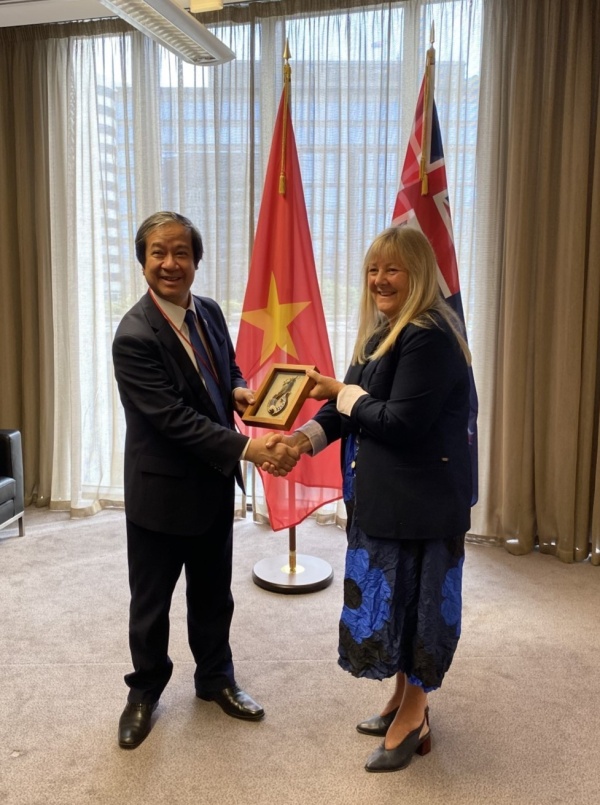
Minister Penny Simmonds present Minister Nguyen Kim Son a gift following the bilateral education ministers meeting.
New Zealand is offering Vietnamese students two government scholarship programmes for secondary school study (the New Zealand Schools Scholarships – NZSS) and for postgraduate study (the Manaaki New Zealand Scholarships). In view of increasing demand for study with New Zealand, ENZ has implemented a wide range of initiatives to equip Vietnamese learners with the 21st century skills, and support families in obtaining up-to-date information to plan for their study journey in New Zealand.
The New Zealand Education Day, ENZ’s flagship event, is scheduled on 19 and 20 October. It has been held annually since 2017 and attracts hundreds of visitors.
-
PIF Recipient: Te Whare Wānanga o Awanuiārangi
Te Whare Wānanga o Awanuiārangi is one of New Zealand’s three wānanga - publicly owned tertiary institutions which provide education in a uniquely Māori cultural context. Awanuiārangi has been engaging internationally for over a decade, delivering postgraduate programmes to Indigenous communities in Washington State and Hawaii, and establishing networks and alliances with Indigenous communities and education providers across the United States.
Now, a new project led by Awanuiārangi is set to accelerate Indigenous education outcomes globally and build on New Zealand’s position as a global leader in postgraduate Indigenous education. ‘Iwi taketake’ (Indigenous people) is a project that will see the development of an international Indigenous curriculum for postgraduate study, covering master’s degrees, postgraduate certificates and diplomas, through to doctoral qualifications.
The target audience for the programme is Indigenous college graduates based at Hawai’i, Washington State, Canada and Australia, with Indigenous college graduates and tribal communities across the United States also in focus. A key objective of the new model is to design an education offering that fits the learner, rather than requiring learners to fit the programme.
Awanuiārangi will take its model of working with local hapū, iwi and their representative organisations in Aotearoa to the four focus areas in the Unites States, where it has already established networks. Iwi taketake will be the result of a co-construction process with Indigenous organisations and potential scholars, with an in-person wānanga (symposium) taking place at each delivery site in the United States.
After the curriculum is developed, endorsed and approved by key stakeholders, Awanuiārangi aims to run Iwi taketake for its first cohort of scholars in 2024, through a blended mix of in-person and online learning across the four sites. The programmes that form the Iwi taketake curriculum may be co-badged - awarded jointly by Te Whare Wānanga o Awanuiārangi and partners offshore, such as the University of Washington Tacoma and the University of Hawai’i Maui College.
Awanuiārangi’s model will affirm the notion that postgraduate education can provide Indigenous scholars with pathways for purpose-led careers that benefit people, place and planet. The subject areas and kaupapa (initiatives) covered by the curriculum will be delivered in a culturally safe environment, respecting Indigenous research ethics and methodologies. Scholars will draw learning directly from their own communities with the support of Awanuiārangi and their local delivery partners, ensuring that programmes are highly relevant to learners’ cultural and social contexts.
The collaborative, co-constructed programme will also serve to strengthen Indigenous links and alliances between New Zealand and the United States more generally, and open further opportunities for collaboration and improving educational success in postgraduate study.
Iwi taketake is one of the initiatives supported by the International Education Product Innovation Fund, a New Zealand Government-funded initiative to reimagine what a New Zealand education can look like and mean for global learners. Education New Zealand Manapou ki te Ao is New Zealand’s government agency dedicated to international education, and is the kaitiaki (guardian) of the Product Innovation Fund.
The Fund is supporting a range of pilot projects that develop and test new education products and services for global learners. Awanuiārangi’s pilot project explores how New Zealand’s strengths in Indigenous education can be delivered to international learners, tailored to Indigenous communities in other countries, and delivered in a blended medium, while uplifting all parties and helping strengthen Indigenous connections and cooperation across the Pacific.
More information:
Learn more about Te Whare Wānanga o Awanuiārangi
*Image at top of page: TWWoA's Professor Mera Penehira with Big Island of Hawaii cohort of doctoral students: Katie Benioni, Nancy Levenson, Noekeonaona Kirby and Taffi Wise.
-
PIF Recipient: Virtual Medical Coaching
In the United States alone, approximately 800 women die each year during pregnancy and within 42 days after delivery. More than 60% of those deaths are believed to be preventable. In developing countries, the rate of pregnancy-related deaths is up to 300 times higher.
An important part of the solution is education. Globally, midwives are in high demand, with the UK’s NHS increasing their places for student midwives by 3000, starting this year. Australia is also planning to increase numbers, while in New Zealand, a funding boost will increase the number of Māori and Pacific students training in midwifery.
While the demand for midwifery training is growing, education offerings haven’t kept up. Childbirth is deeply personal, and feedback from mothers – validated by hospital staff – is that they do not wish to have extra staff or students in the room for training. With no effective opportunities for face-to-face learning, there is a global need for a realistic and scalable childbirth simulation.
That’s where Virtual Medical Coaching’s vision comes in, supported as a recipient of the International Education Product Innovation Fund. Virtual reality (VR) software will provide a safe and controlled environment for students to see and assist in childbirth simulations, both with and without complications and in a range of different scenarios. As the student improves, the simulations they encounter increase in difficulty. A machine-learning algorithm enables fast and accurate feedback to both the learner and any tutors.
The simulation will be interactive and responsive, meaning that any action taken by a student creates a life-like consequence and reaction. The outcome is that learners are taught to effectively make decisions and problem solve.
Existing options for midwifery training include a physical mannequin simulator, but this can be prohibitively expensive, out of reach of many training providers, and doesn’t offer students maximum learning hours. In addition, existing options don’t include the ability to witness mechanisms like rotations/restitutions or the ability to have back and forth conversations. By contrast, the VR simulation will be available to students wherever they are, and whenever they need to practice. The nature of the VR experience means that modern learning styles, such as asynchronous and remote learning, are well catered for.
With support from the International Education Product Innovation Fund, Virtual Medical Coaching’s childbirth simulation is on track to become fully released by the end of 2024. A beta-version is already used by some educators globally. The Product Innovation Fund is a New Zealand Government-funded initiative to reimagine what a New Zealand education can look like and mean for global learners.
Managed by Education New Zealand Manapou ki te Ao (ENZ), New Zealand’s government agency for international education, the fund is supporting a range of pilot projects from existing and emerging New Zealand education providers. Together, the projects rethink how an education experience from New Zealand can be delivered, and create impact, for global learners.
For Virtual Medical Coaching, it’s about finding a better solution to a serious issue. Like many other innovative Kiwi education technology companies, Virtual Medical Coaching is designing technology that will create positive impact around the world. It’s already successfully developed an x-ray simulation for healthcare professionals which has won multiple national and international awards. Now, with the support of ENZ through the International Education Product Innovation Fund, Virtual Medical Coaching is set to respond to a clear need for better midwifery training options and develop another cutting-edge learning product for both New Zealand and offshore markets.
More information:
-
We want to hear from you!
This survey is important to gauge ENZ’s performance and importantly, let us know how we’re doing, what services you value and what you’d like to see more of.
In last year’s survey, you highlighted several themes that we’ve been working to address. We heard that you need more advance notice of our global events to allow you to plan better. In response, we published our event calendar in November, covering events to be held in the last half of 2024.
You also said you wanted to see closer alignment between government agencies and the sector. As a result, we have worked with peak bodies and key government agencies to refresh the purpose of the quarterly Peak Body Forum and built a closer working relationship with the Alliance of Peak Bodies.
Other important themes included improving our engagement and integrating views of the sector in our planning, while providing more clarity on our range of services and support. We have provided more webinars ranging from showcasing the regions to the global agent network, through to leveraging research, data and analysis to provide you with targeted market insights.
Peak body and sector representatives were involved early in our business planning, including market prioritisation, to ensure that we walk in step with the sector.
While we may not always get it right, you can rest assured that we are listening and continually striving to deliver the products and services that you value and help you to grow.
A survey link will be sent out in early May. We look forward to hearing your thoughts to enable us to improve our support to the New Zealand international education sector. Thank you in advance for your participation.
-
Applications for the 2024 PPP New Zealand-German academic exchange programme are now open!
An information session is being held on Tuesday 23 April and is open to all New Zealand and German academics (graduates, doctoral candidates, doctorate holders, professors and lecturers). Click here to register for the information session and click here for more information on the PPP programme.
Please share this information with your networks.
-
ENZ Agent Seminars in China make a strong impact for rebuilding connections
China is the largest source of international students for New Zealand with agents being the leading channel for student recruitment in this market. Building strong connections between providers and agents in China is critical to recovering student mobility, improving awareness of New Zealand as a study destination and strengthening New Zealand's market position. ENZ's Agent Seminars in China are a well-recognised and impactful way of building relationships with a range of key agents.
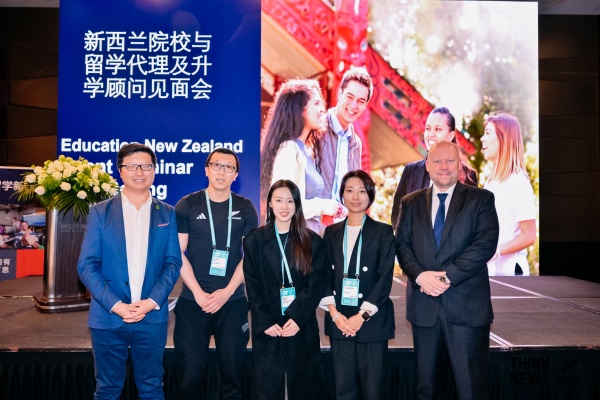
Education Counsellor and ENZ’s Regional Director Greater China, Michael Zhang, (far left) at the Beijing Agent Seminar with representatives from New Oriental Education Agency and H.E. Grahame Morton, New Zealand Ambassador to People’s Republic of China.
In addition, Agent Seminars also help to keep agents informed with the latest official information and is an important tool that Education New Zealand Manapou ki te Ao (ENZ) and other NZ Inc agencies use to share such information. According to recent Immigration New Zealand (INZ) data, agents in China have a high approval rate for student visa processing.
Currently, ENZ runs its Agent Seminar series twice a year in this region and this latest series of events held in Chengdu, Shanghai, Hong Kong and Beijing were supported by the New Zealand Ministry of Foreign Affairs and Trade (MFAT) and INZ. INZ’s China-based representatives gave in-person presentations, an initiative which was well received with 88% of agents reporting its inclusion as “very or extremely important to their attendance” in a post-event survey.
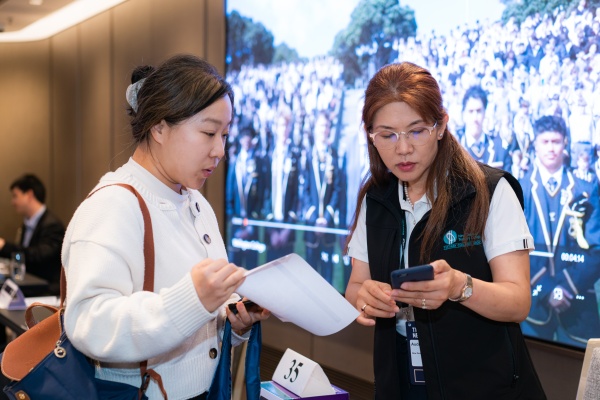
Participants at the Hong Kong Agent Seminar discuss New Zealand education offerings.
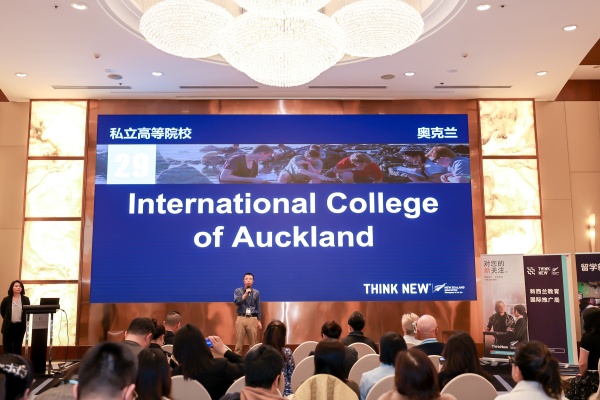
Kevin Wang from the International College of Auckland presenting at the Shanghai Agent Seminar.
To leverage the visibility of New Zealand education providers in the China market, ENZ facilitated media interviews and social media recordings for participants at the Shanghai and Chendgu Seminars. New Zealand providers and ENZ representatives in Chengdu conducted interviews with 13 journalists, the highest response rate for media attending Agent Seminars to date. As a result, three million views were achieved from 58 stories published by 27 local media outlets, with New Zealand university representatives quoted in a media story and an exclusive interview and story for Te Pūkenga on the uniqueness of New Zealand's vocational education in a separate article.
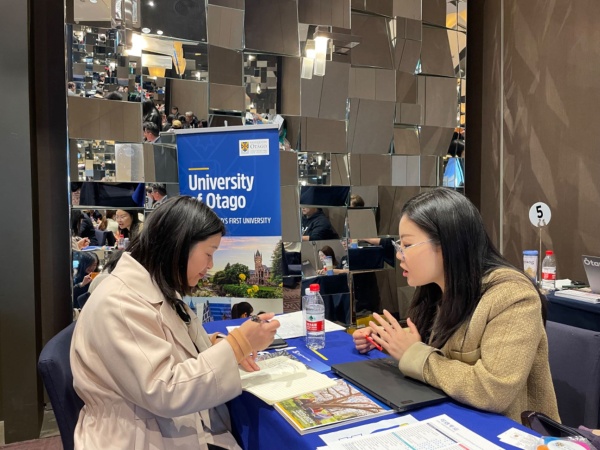
Joyce Zhang, University of Otago, is interviewed by a journalist from local media in Chengdu at the ENZ Agent Seminar.
In Shanghai, the ENZ Shanghai team delivered a China marketing insights session for sector representatives. The presentation titled “Unlocking China’s Education Market: Insights and tools for success” covered:
-
The key drivers of the consumer
-
China’s media/digital/social media landscape
-
The big four – WeChat, Little Red Book, Douyin and Bilibili (case studies included)
-
ENZ’s China local marketing plan.
Anyone interested in receiving a copy of the Marketing Presentation can access this here on ENZ’s Intellilab.
ENZ collaborated with Shinyway, the largest agent in the eastern region of China to produce short videos for the agency to promote online. The online promotion aimed to leverage brand awareness of a New Zealand education showcasing New Zealand providers attending the Shanghai event. A big kudos goes to the 18 brave New Zealand representatives who accepted the invitation to participate in the filming. Education Counsellor and Regional Director Greater China, Michael Zhang, was also interviewed to present the advantages of a New Zealand education and our institutions across all sectors.
Shinyway has published all the videos on their consumer-facing social media platforms, including WeChat, Little Red Book, and Weibo. The collaboration enhances New Zealand providers’ market exposure by leveraging Shinyway's influence across their digital platforms and reaching prospective audiences in China elevating our brand profile within a highly targeted audience group.
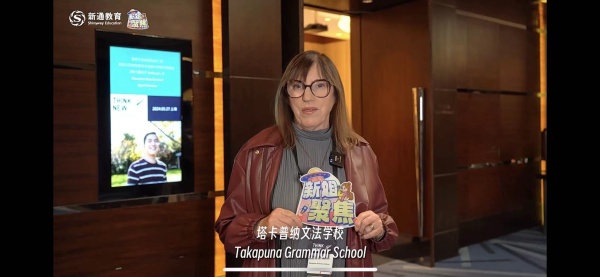
Mary Nixon, Principal of Takapuna Grammar School participating in the recording for sharing on social media. The first trial video published on Shinyway's WeChat received over 300 engagements including likes, shares, favorites and comments.
87.5% of New Zealand education providers also said that “attendance at the seminars was either “very valuable” or “valuable” for their organisation.”
The dates and locations for the next round of Agent Seminars in China will be announced soon. These details will be posted on the ENZ Events page along with the link for registering.
-
-
From the Acting Chief Executive: A lot to be proud of
Tēnā koutou katoa
Earlier this month a New Zealand business publication ran a column that challenged the role of international education in delivering our Government’s objective of double the export earnings. As you might expect, I could not let the challenge go unanswered. You can read the full response on the ENZ website, but I thought there was merit in highlighting a couple of the key points along with some of the excerpts as they provide a good summary of the state of international education in New Zealand today.
The first point I made in my response confirmed that students are returning. We recently published the Ministry of Education’s enrolment data for 2023 (part-year) which firmly backed this up.
“Students are returning to New Zealand. In the first eight months of 2023 international student enrolments topped 59,000 with all sectors experiencing growth except wānanga. Accepting that it is from a low base, comparing 2023 to 2022, Universities have bounced back strongly reporting a 15% increase from 24,040 to 27,535.“
“In the first eight months of 2023 English Language Schools saw the greatest percentage increase in international enrolments, increasing by 347% from 1,565 to 7,001. Schools reported a 114% increase from 5,925 to 12,662. NZIST Te Pūkenga, a 32% increase from 4,955 to 6,560 and Private Training Establishments (funded and unfunded), a 13% increase from 5,000 to 5,671.”
Of these enrolments, students from India continue to provide the second highest number of enrolments in New Zealand. In recognition of our valued partnership, I am delighted to announce that the Republic of India will headline as Country of Honour at NZIEC KI TUA 2024.
The designation of Country of Honour at NZIEC KI TUA celebrates our international education connections with partner countries and I am pleased that we can celebrate the growing education connections between our two countries in this way. You can read more about this announcement along with a call for speakers in our E-News story here.
The second point from my response that I would like to reiterate is that: We have a plan and the sector is working together to deliver.
I highlighted that “The New Zealand International Education Strategy, revised in 2022, sets out a multi-year action plan to develop a high-value, resilient and innovative education sector for both international and domestic students. Further the new Government’s manifesto made clear their vision and priorities for international education. “
“I can also assure you that the sector is working together to achieve its goals, that all eight universities participated in a recent ENZ-led delegation to India, is just one example of the co-operation.”
It was very timely that I then received a wonderful note of appreciation from a Dunedin City Councillor this week for the work of the many people within ENZ and the sector involved with the recent Korean agent famil. This was further evidence that we are working collaboratively as a sector and delivering benefits to the international education ecosystem and our regions.
Councillor Christine Garey said “The input from ENZ has helped over the years to establish and maintain an international education ecosystem in the city. It’s encouraged transitions between school and tertiary education and supported a strong growth agenda with increased higher quality students staying longer.
However, of particular benefit has been access to inbound/outbound famils and delegations. ENZ’s support in bringing agents to our city has been especially valuable and allowed us to showcase what Ōtepoti, Dunedin has to offer. There is no replacement for this in person experience and we look forward to these visits continuing to rebuild relationships globally.
Study Dunedin and the international education ecosystem are in good heart here in Ōtepoti Dunedin, working collaboratively and effectively. We look forward to ENZ’s continuing support and especially, we warmly look forward to welcoming future famils to our city.”
Keep up the great work, everyone.
He manawa tītī
Endurance is a virtue that cannot be understated.
Dr Linda Sissons
Acting Chief Executive


